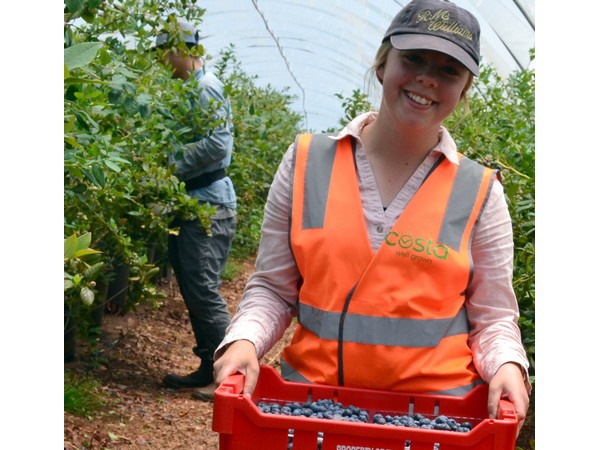A project that aims to evaluate and maintain the quality of post-harvest blueberries is using novel technology for taste evaluation of fresh foods. Tasmanian Institute of Agriculture (TIA) student Sarah McKay is in the final year of a four-year Bachelor of Agricultural Science degree and will present her Honours project at the Honours Seminar on Friday, October 8.
For her project: Evaluating Post-Harvest Shelf-Life, Quality Characteristics and Their Optimisation in Blueberry Fruit (Vaccinium spp.), Sarah has used an electronic tongue system (e-tongue) as well as several other instrumental methods and a human taste panel for comparison.

“My project is around maintaining and evaluating quality post-harvest through different storage conditions, mainly temperature and its influence on key quality characteristics of fresh blueberries over time,” Sarah said.
“The characteristics include color, aroma and texture, with emphasis on the influence the conditions have on taste profiles. The e-tongue is a piece of technology that has not been used extensively on fresh fruit, especially blueberries, so this is a major focus for my project,” Sarah said.
Making students job-ready
“Industry connections gained throughout the degree are vital to the success of students’ projects and contributes to the very high employability rate of TIA Honours graduates.
“The degrees taught by TIA in Agriculture, Agricultural Science and Microbiology all have a strong focus on hands-on experience and direct industry engagement to help make students job-ready as soon as they graduate.”
Sarah is hoping her project will see real-life applications in helping map consumer purchasing habits based on quality characteristics. Industry collaboration and the skills and knowledge she has gained from her Honours will soon be put to good use, as she has already accepted a graduate position at Hillwood Berries.
“I have been lucky enough to work for the company that I developed this project with; hands-on experience in the field within the horticultural sector is invaluable and will hopefully help me in future employment,” Sarah said.
Storage methods
“The best moment in my research would have to be getting to work with industry professionals to develop a project that would aid the industry in confirming and/or improving existing post-harvest blueberry storage methods,” Sarah said.
“I hope this study can help aid industry in determining the correct storage temperature and storage period to maintain quality of a number of key blueberry varieties grown in Tasmania, as well as aid the industry in using alternative technologies such as the e-tongue to measure key quality characteristics during storage to map consumer acceptance and shelf-life based on these qualities.”
And for future agriculture science students, Sarah has some advice. “Don’t be afraid to give something a go. Just because you’ve never done it before or think you wouldn’t be good at it doesn’t mean you shouldn’t try. Even if you don’t come from a background in your area of interest doesn’t mean you can’t participate and develop the skills to become good at it."
For more information:
University of Tasmania - Institute of Agriculture
www.utas.edu.au
